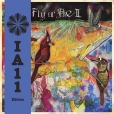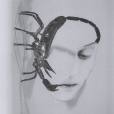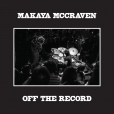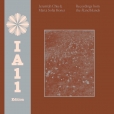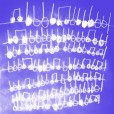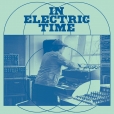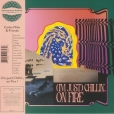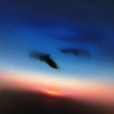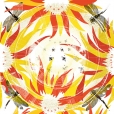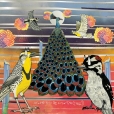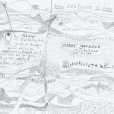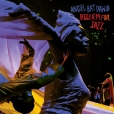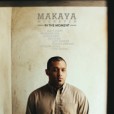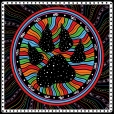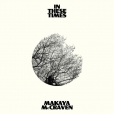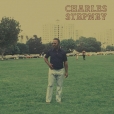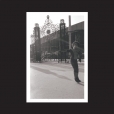Your basket is empty

Jeff Parker
The Way Out Of Easy
International Anthem Recording Co.
Stewart Smith in The Wire: ‘Jeff Parker and his ETA IVtet go deeper into the hypnotic minimalism that made its predecessor Mondays At The Enfield Tennis Academy a highlight of 2022. Parker’s recent music represents one of the most sophisticated applications of hiphop language into jazz, whether he’s playing over beats and loops or imitating their feel in real time. Parker and the ETA IVtet have their groove down to the point where it’s no longer fusion but a fully integrated sound, drawing on the unquantised beats of J Dilla and Madlib, and the time stretching strategies of psychedelia, krautrock and dub.’
‘With Touch, the Tortoise bandmembers — Jeff Parker, Dan Bitney, Douglas McCombs, John Herndon, and John McEntire — harness their collectivist songwriting approach, a slightly anarchistic but resolutely egalitarian process where ideas triumph over ego towards an abstracted muscularity. While there are still excursions into the dusky, elegantly gnarled jazz ambience that flourished on landmark works like Millions Now Living Will Never Die and TNT, Touch is perhaps most remarkable for Tortoise’s unapologetic embrace of grand gesture. Aerodynamically re-engineered Krautrock, hand-cranked techno rave-ups, and pointillist spaghetti western fanfares are all imbued with Tortoise’s now-signature internal logic — equally alluring and confounding, a puzzle to be savored rather than solved.’
Jeremiah Chiu, Marta Sofia Honer
Recordings from the Aland Islands
International Anthem Recording Co.
Intensely evocative, meditative duets by modular synthesizer and viola, interwoven with field recordings — birds, the sound of forests — encapsulating sojourns on the Åland archipelago in the Baltic Sea, between Sweden and Finland.
‘Quietly multi-rhythmic, modular-trance-meets-processed-and-unprocessed-chamber strings, bewitching and bewildering field recordings all knitted tightly, an LA patchwork.’
“Our studios are side-by-side. When we were writing this album, you might have found us tracking viola stacks in one studio while, in the other, we were writing through-composed themes and rearranging the material. Granular synthesis and tape manipulation are key tools we use to create variation and movement in a composition. This process often yields surprising results, capturing the emotion but expressing it in unexpected ways. It feels essential that we embrace a bit of chance.
“In contrast to our first album, Recordings from the Aland Islands, we wanted this music to feel very present. Where Recordings was intended to transport you to another place, Different Rooms is meant to meet you where you are. It’s a decidedly urban album. The field recordings were captured on rain platforms, in city streets, in rooms at home, and intentionally paint a quotidian sonic image, blurring the line between what you hear in your own environment and what is on the record.”
Featuring Jeff Parker.
‘Minimalism is usually cool, detached, frictionless and mathematical. The music made by percussionist Bex Burch is not any of these things. What she calls ‘messy minimalism’ shares some characteristics with the music of Steve Reich and John Adams, but this is minimalism that isn’t afraid to break into a sweat and get its hands dirty (quite literally, given that Burch actually builds her own instruments from scratch). She mainly plays a gyil, a marimba-like tuned percussion instrument she learned while studying music in Ghana.
‘Burch’s first solo album lands her in Chicago, enlisting trumpeter Ben LaMar Gay and members of Tortoise. Sometimes, the results sound like an earthier Philip Glass: Dawn Blessings pairs her dreamlike, two-note gyil pattern with violinist Macie Stewart’s beautiful harmonies; Don’t Go Back to Sleep sees Burch’s gyil fractionally out of phase with a synthesiser, then spins into hypnotic but disorientating minimal techno.
‘Other tracks get wilder. There are drum circles, water drums and birdsong; tracks that exploit the acoustics of a California canyon. Pardieu turns a three-note xylophone riff into a compelling funk groove; Fruit Smoothie With Peanut Butter is a wonderfully chaotic drum circle that sounds melodic despite not featuring any tuned instruments. Best of all is You Thought You Were Free?, which layers clattering percussion over the wailing siren of a tornado warning relayed over Chicago until it sounds like a freakish fusion of the Master Musicians of Joujouka and Fela Kuti’ (The Guardian).
Nineteen, hip-hoppin, be-boppin capsules of funk, conjured and distilled from a year’s worth of weekly shows by the drummer, in a reclaimed bank vault in the heart of Chicago’s Ukrainian Village.
Jazz improvisation — but compact, to-the-point and organic as a mosquiter’s tweeter — dipped in krautrock, d&b, house and B-boy science. Featuring the brilliant vibes playing of Justefan, and local luminaries like Jeff Parker from Tortoise and De’Sean Jones from Underground Resistance.
Warmly recommended.
Camae Ayewa aka Moor Mother, trumpeter Aquiles Navarro, drummer Tcheser Holmes, saxophonist Keir Neuringer, and bassist Luke Stewart.
Raw, organic punk-jazz, trying out electronics and synthesizers for the first time.
‘Irreversible Entanglements’ fearless music takes to task the police, American politics, capitalism, and racism (The Nation).
‘The jazz ensemble evokes our American topography, both physically and psychologically, by capturing what’s in the news and what’s underneath that surface’ (Pitchfork).

